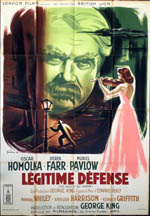|
Code of Scotland Yard
Code of Scotland Yard is a 1947 British crime film directed by George King and starring Oskar Homolka, Muriel Pavlow and Derek Farr. It was originally released as The Shop at Sly Corner, being based on the popular stage play of that title by Edward Percy.[3][4] SynopsisA French antique dealer lives a comfortable life in London. He cares only for his daughter, who is trying to become a professional concert violinist. When his shop assistant discovers that much of his money comes from fencing stolen goods he attempts to blackmail the Frenchman. Cast
Original playThe film was based on a play by Edward Percy, a Conservative MP.[5] It debuted in London in May 1945. Variety called it "good theatre".[6] It ran for over two years.[7] The London production only cost $12,000 and made a sizeable profit for its investors.[8] The play was produced on Broadway with Boris Karloff in 1949 but only ran seven performances.[9] BBC TV versionThe play was adapted for BBC TV in 1946.[10] ProductionFilm rights were bought by British Lion in May 1945.[11] It would be one of the first three films made by Alexander Korda under his new deal with British Lion, the others being A Man about the House and Nightbeat. Oscar Homolka was imported from the USA to star.[12] George King was to make A Lady was to Die but delayed that to make this movie. Filming started at 6 August 1946.[13] It was shot at Isleworth Studios.[14] The film's sets were designed by the art director Bernard Robinson. It was the film debut of Diana Dors. According to film reviewer Stephen Vagg, "The part was an ideal way to start out – the girlfriend of a slimy blackmailer – and Diana had 'it' from the start; looks, warmth, appeal".[15] Muriel Pavlow and Derek Farr, who played lovers in the film, were married shortly after filming.[16] Critical receptionVariety reported that the "film gathers pace and is truly cinematic in the second half, but the first part is deadly slow and too explanatory without explaining much. More, too, should have been made of the romance between the two young lovers."[17] TV Guide described it as an "interesting melodrama rich with character, thanks to the excellent performance by Homolka and a uniformly fine British cast."[18] Box OfficeAs of 30 June 1949 the film earned £124,197 in the UK of which £92,877 went to the producer.[1] References
External links
|
||||||||||||||||||||||||||||||||||||
